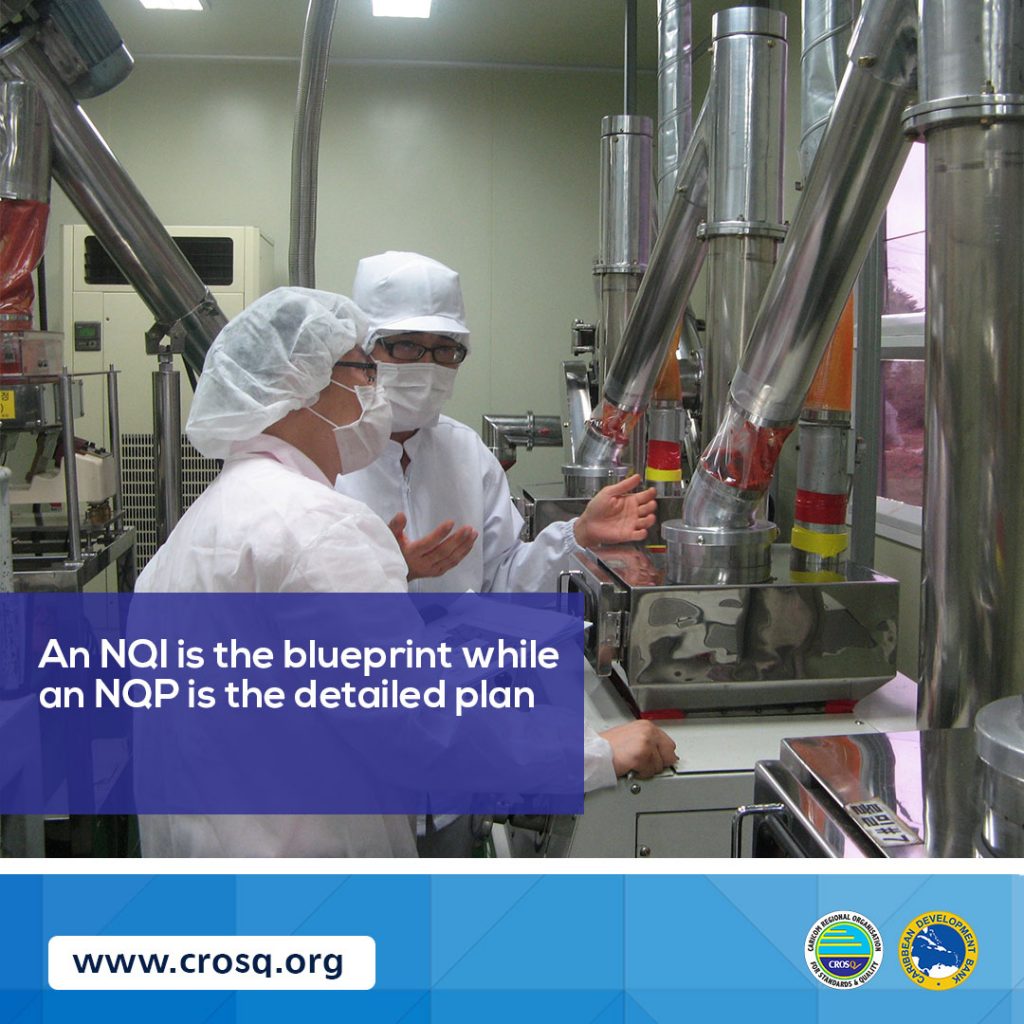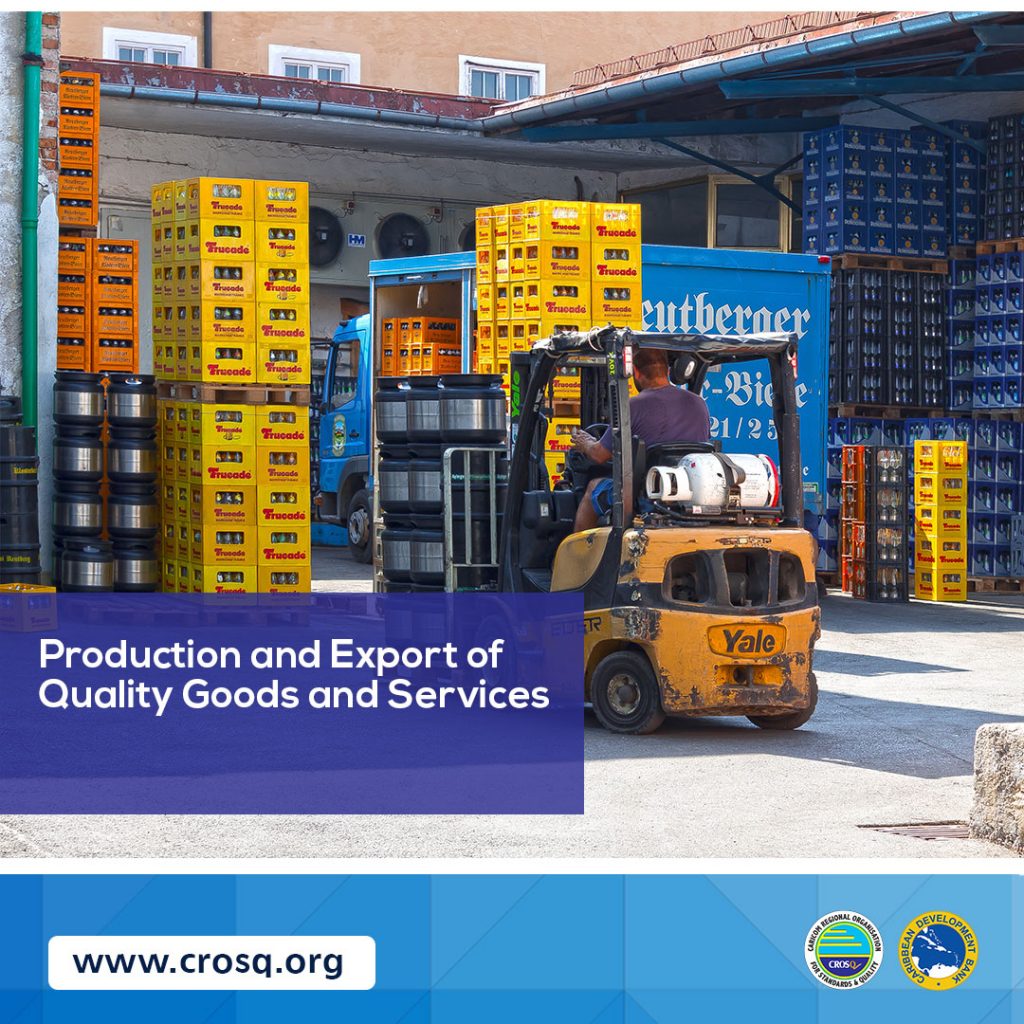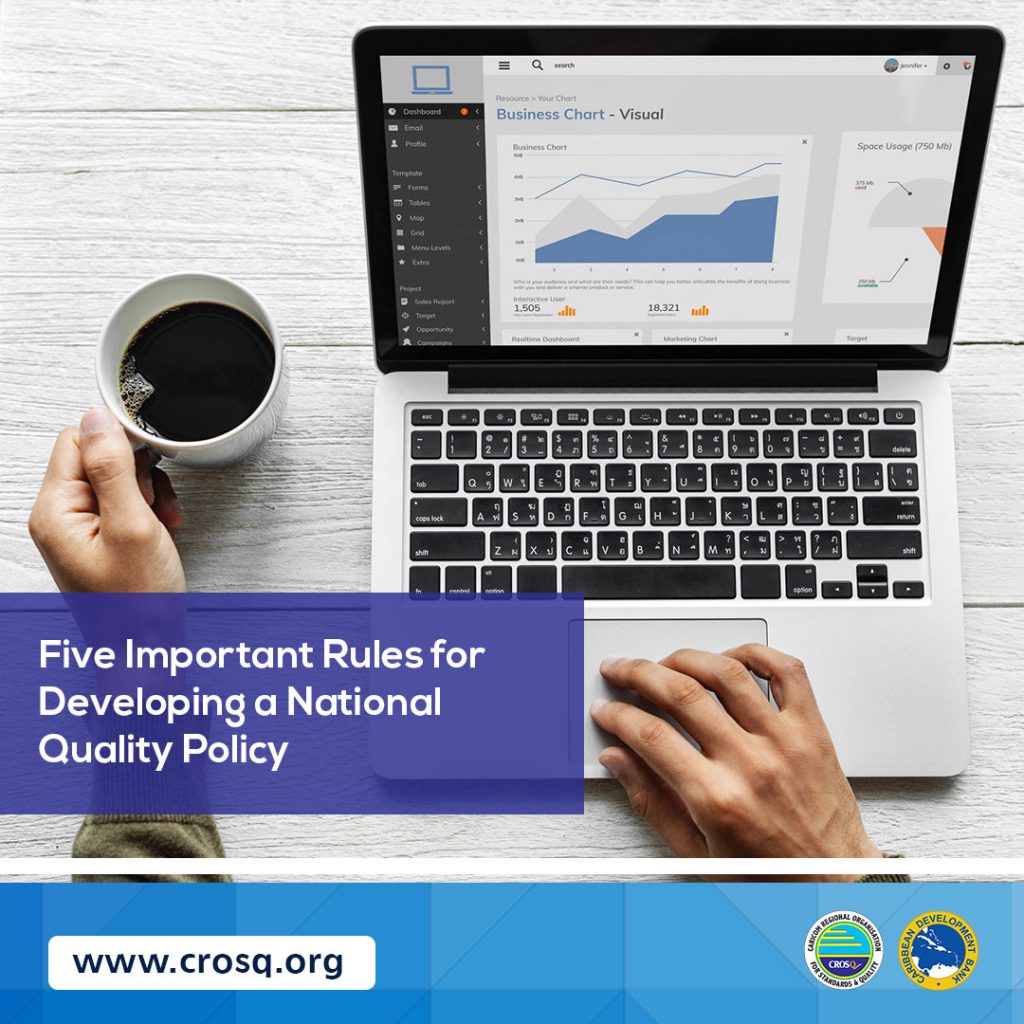Why is a National Quality Policy Important?
- crosqblog
- on Oct, 13, 2019
- Category National Quality Policy
- No Comments.

A National Quality Policy (NQP) and a National Quality Infrastructure (NQI) may seem similar on the surface. However, they are starkly different. An NQI is the framework put in place to ensure a country has strong industry standards and conforms to those standards in all aspects of national operations. On the other hand, an NQP governs the actual development and execution of the NQI. An NQP is where the initial decision-making happens.
What is a National Quality Policy?
The Jamaica Information Service (JIS) defines an NQP as “the government’s position on the goods and services produced and consumed in [a country]. It facilitates the production and export of quality goods and services through the establishment and use of an NQI to ensure compliance with global market requirements”. This definition highlights three pillars of a strong NQP:
- Government approval
- Production and export of quality goods and services
- Connection with an NQI to meet current global market requirements
Government Approval
The word national in the NQP is important. It emphasizes the fact that an NQP is not limited to “brand name” companies in a country, such as Grace Kennedy in Jamaica or Baron Foods in Saint Lucia. Governments, in conjunction with several national stakeholders, play a crucial role in drafting an NQP and facilitating its effective implementation so that all local businesses, large or small, can benefit. Support from all government officials is, therefore, crucial.

Production and Export of Quality Goods and Services
It is insufficient to compete solely based on price in this highly competitive global marketplace. High quality and exceptional service win every time. One may argue that selling cheaper products have worked for China and should, therefore, work for small Caribbean countries. Caribbean countries are only a small speck on the globe and cannot be compared to a large, developed country such as China. Goods and services produced by Caribbean countries will only stand out if their quality is superior to their counterparts.
Consequently, an NQP is necessary to govern the quality of the production and export of goods and services from the Caribbean. Lamenting about the lack of resources will not solve the problems we face with unemployment and slow economic growth. An NQP tackles the problem at its source and forces Caribbean businesses to step up their game with the limited resources they have.
Meeting Global Market Requirements
An NQI is the blueprint, while an NQP is the detailed plan that brings all stakeholders together to create a beautiful mansion. One cannot function without the other. Both an NQI and an NQP provide the guidance necessary to help Caribbean businesses meet global market requirements.
Competition is no longer restricted to the Caribbean region; it extends beyond Caribbean borders into an exciting world of global opportunities. An NQP provides the fuel needed for Caribbean businesses to stare global competition in the face and say, “I’ve got this!”
Five Important Rules for Developing a National Quality Policy

The World Health Organization (WHO) outlines eight elements that must be considered when developing an NQP. Although their descriptions are aligned with global health best practices, the steps outlined can be extrapolated to describe the general development of any NQP. We have condensed the eight elements into five important rules as described below.
Rule #1: Assess the Current State of Quality
It is highly likely that many Caribbean people have a basic understanding of quality. However, an NQP should not be developed until quality is clearly defined. There should be no ambiguity. Once a consensus is reached about a clear definition of quality, the current state of product and service quality should be assessed. This assessment should lead to gaps being identified and goals being set to close them.
Rule #2: Set National Goals and Priorities
A sailor sails aimlessly without a compass to direct his path. The same is true for a country without clear quality goals; the goals act as a compass to guide the country towards successful enforcement of quality standards and other quality practices. Priorities direct key stakeholders to areas with the greatest need. Goals should be properly aligned with priorities so that the steps that will be taken to achieve the priorities are clear.
Rule #3: Identify and Engage Key Stakeholders
Government agencies are not the only stakeholders in the effective development and implementation of NQPs. Strong public and private sector partnership is necessary. Some of the stakeholders needed include:
- An accreditation body
- Financiers
- A metrology body
- A standardization body
- A testing and certification body
- Community organizations
- Entrepreneurs
- Media
It may also shed light on new government agencies that need to be created. For instance, the Jamaican government revamped its NQP in 2017. The revised NQP led to the development of the Jamaica National Agency for Accreditation (JANAAC), and the National Compliance and Regulatory Authority (NCRA) to clearly separate the roles and responsibilities of national quality agencies in keeping with international guidelines and practices.
It is also important to remember that customers are stakeholders. After all, the changes created and enforced by an NQP impact them. Therefore, consumers should be aware of the NQP, what it means for them and how they can support its effective implementation in their countries.
Rule #4: Identify Quality Indicators and Core Measures
This rule is closely linked to the second rule which described the importance of setting goals and priorities. Each goal should be linked to a quality indicator and core measure. Doing this ensures that goals are not things that are just picked out of thin air. Instead, they have a clearly measured and understood purpose. Policies and processes that support these indicators and measures should also be clearly established and understood by all stakeholders.
Rule #5: Describe Improvement Methods and Interventions
It can be argued that one of the issues plaguing the Caribbean is that we do not have adequate follow-through. In other words, we do not effectively evaluate policies that have been implemented to identify their strengths and weaknesses. Evaluation is a crucial stage in the process so that adjustments can be made to prevent long-term problems. An NQP is not created in a vacuum; it is constantly improved to ensure that it meets the evolving needs of a nation and the ever-changing global marketplace.
Examples of Strong Caribbean NQPs in the Making
The Governments of Antigua and Barbuda, Grenadian and Suriname have been working assiduously with CROSQ to develop NQPs. This initiative is funded through the Caribbean Development Bank (CDB). Several regional and local stakeholders are coming together to ensure that the policies are ready for dissemination in December 2019.
CROSQ’s Role in the Development of a Regional Quality Policy
The CARICOM Regional Organization for Standards and Quality (CROSQ) is the Caribbean region’s umbrella body for facilitating standards and quality development. Each country has a National Standards Bureau (NSB) that is responsible for effective implementation of an NQP within the country, where they may exist. However, CROSQ has developed a Regional Quality Policy that acts as a framework which these NSBs can use to develop strong NQPs.
CROSQ has had notable success in developing an RQP that addresses the World Trade Organization’s (WTO) Technical Barriers to Trade (TBT) requirements. This RQP was created with initial support of the 10th European Development Fund Technical Barriers to Trade Programme which ended in 2017. The policy was completed and published in 2019.
Final Words
An NQP and NQI work in tandem to create globally competitive products and services. Effective implementation of an NQP requires buy-in from all stakeholders, including consumers. Government agencies should work with private sector organizations to ensure that an NQP adequately supports an NQI’s mandate for creating the best products and services in Caribbean nations. The five rules NQP development must hold true.





